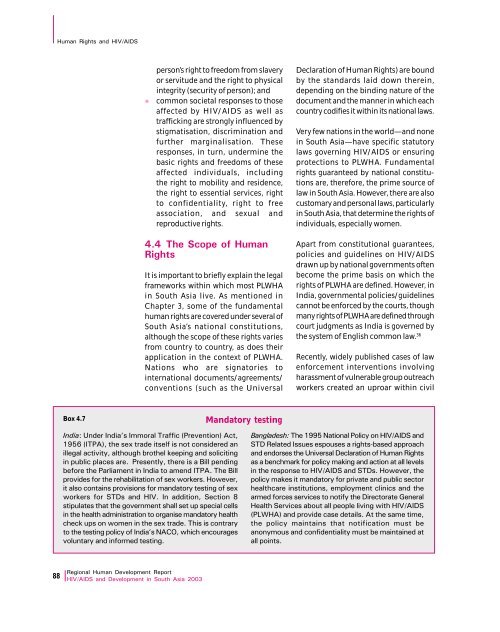Download Report - UNDP Asia-Pacific Regional Centre - United ...
Download Report - UNDP Asia-Pacific Regional Centre - United ...
Download Report - UNDP Asia-Pacific Regional Centre - United ...
Create successful ePaper yourself
Turn your PDF publications into a flip-book with our unique Google optimized e-Paper software.
Human Rights and HIV/AIDSlperson’s right to freedom from slaveryor servitude and the right to physicalintegrity (security of person); andcommon societal responses to thoseaffected by HIV/AIDS as well astrafficking are strongly influenced bystigmatisation, discrimination andfurther marginalisation. Theseresponses, in turn, undermine thebasic rights and freedoms of theseaffected individuals, includingthe right to mobility and residence,the right to essential services, rightto confidentiality, right to freeassociation, and sexual andreproductive rights.Declaration of Human Rights) are boundby the standards laid down therein,depending on the binding nature of thedocument and the manner in which eachcountry codifies it within its national laws.Very few nations in the world—and nonein South <strong>Asia</strong>—have specific statutorylaws governing HIV/AIDS or ensuringprotections to PLWHA. Fundamentalrights guaranteed by national constitutionsare, therefore, the prime source oflaw in South <strong>Asia</strong>. However, there are alsocustomary and personal laws, particularlyin South <strong>Asia</strong>, that determine the rights ofindividuals, especially women.4.4 The Scope of HumanRightsIt is important to briefly explain the legalframeworks within which most PLWHAin South <strong>Asia</strong> live. As mentioned inChapter 3, some of the fundamentalhuman rights are covered under several ofSouth <strong>Asia</strong>’s national constitutions,although the scope of these rights variesfrom country to country, as does theirapplication in the context of PLWHA.Nations who are signatories tointernational documents/agreements/conventions (such as the UniversalApart from constitutional guarantees,policies and guidelines on HIV/AIDSdrawn up by national governments oftenbecome the prime basis on which therights of PLWHA are defined. However, inIndia, governmental policies/guidelinescannot be enforced by the courts, thoughmany rights of PLWHA are defined throughcourt judgments as India is governed bythe system of English common law. 36Recently, widely published cases of lawenforcement interventions involvingharassment of vulnerable group outreachworkers created an uproar within civilBox 4.7Mandatory testingIndia: Under India’s Immoral Traffic (Prevention) Act,1956 (ITPA), the sex trade itself is not considered anillegal activity, although brothel keeping and solicitingin public places are. Presently, there is a Bill pendingbefore the Parliament in India to amend ITPA. The Billprovides for the rehabilitation of sex workers. However,it also contains provisions for mandatory testing of sexworkers for STDs and HIV. In addition, Section 8stipulates that the government shall set up special cellsin the health administration to organise mandatory healthcheck ups on women in the sex trade. This is contraryto the testing policy of India’s NACO, which encouragesvoluntary and informed testing.Bangladesh: The 1995 National Policy on HIV/AIDS andSTD Related Issues espouses a rights-based approachand endorses the Universal Declaration of Human Rightsas a benchmark for policy making and action at all levelsin the response to HIV/AIDS and STDs. However, thepolicy makes it mandatory for private and public sectorhealthcare institutions, employment clinics and thearmed forces services to notify the Directorate GeneralHealth Services about all people living with HIV/AIDS(PLWHA) and provide case details. At the same time,the policy maintains that notification must beanonymous and confidentiality must be maintained atall points.88<strong>Regional</strong> Human Development <strong>Report</strong>HIV/AIDS and Development in South <strong>Asia</strong> 2003
















